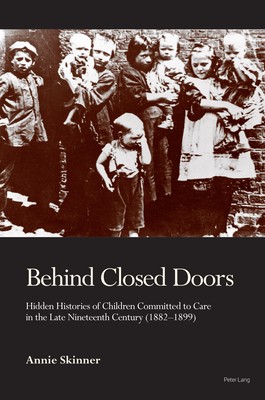
- We will send in 10–14 business days.
- Author: Annie Skinner
- Publisher: Peter Lang Ltd, International Academic Publishers
- ISBN-10: 1789973732
- ISBN-13: 9781789973730
- Format: 15.2 x 22.9 x 1.5 cm, softcover
- Language: English
- SAVE -10% with code: EXTRA
Behind Closed Doors; Hidden Histories of Children Committed to Care in the Late Nineteenth Century (1882-1899) (e-book) (used book) | bookbook.eu
Reviews
Description
Annie Skinner explores the challenges and obstacles faced by children who were removed from their families by the state in the nineteenth century. The children in this study were rescued from neglected, abusive or dangerous situations and committed to care, but in the process were criminalized and incarcerated in industrial schools until they turned sixteen. Using letters from the children, their parents and correspondence from the authorities, the author focuses on the children's experiences of their removal. We hear first-hand how children growing up in a controlled environment learnt how to navigate their way through the tough regimes of the institutions and resisted authority. The author shows how attitudes towards children in care were dominated by the belief that removing contact with their parents was essential in order to avoid repeating a negative history. A wholly new life was needed for a healthy and secure social development. At the heart of this new life was a future in domestic service. However, here children also faced stigma from employers and authorities. Skinner positions the voice of the child at the forefront of her study by offering close readings of children's letters, taken from source. And so she allows us to see the impact of such policies on lives, as well as their isolation as a result of removal and their search for identity.
EXTRA 10 % discount with code: EXTRA
The promotion ends in 18d.19:04:02
The discount code is valid when purchasing from 10 €. Discounts do not stack.
- Author: Annie Skinner
- Publisher: Peter Lang Ltd, International Academic Publishers
- ISBN-10: 1789973732
- ISBN-13: 9781789973730
- Format: 15.2 x 22.9 x 1.5 cm, softcover
- Language: English English
Annie Skinner explores the challenges and obstacles faced by children who were removed from their families by the state in the nineteenth century. The children in this study were rescued from neglected, abusive or dangerous situations and committed to care, but in the process were criminalized and incarcerated in industrial schools until they turned sixteen. Using letters from the children, their parents and correspondence from the authorities, the author focuses on the children's experiences of their removal. We hear first-hand how children growing up in a controlled environment learnt how to navigate their way through the tough regimes of the institutions and resisted authority. The author shows how attitudes towards children in care were dominated by the belief that removing contact with their parents was essential in order to avoid repeating a negative history. A wholly new life was needed for a healthy and secure social development. At the heart of this new life was a future in domestic service. However, here children also faced stigma from employers and authorities. Skinner positions the voice of the child at the forefront of her study by offering close readings of children's letters, taken from source. And so she allows us to see the impact of such policies on lives, as well as their isolation as a result of removal and their search for identity.


Reviews